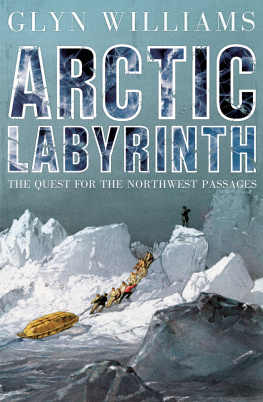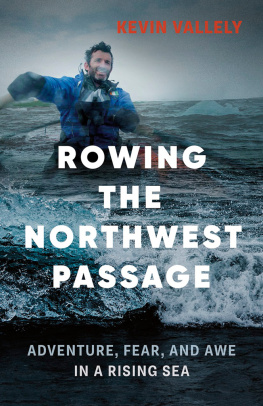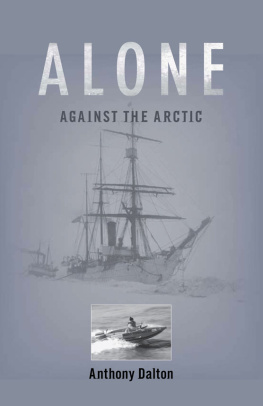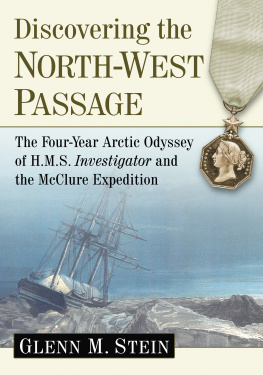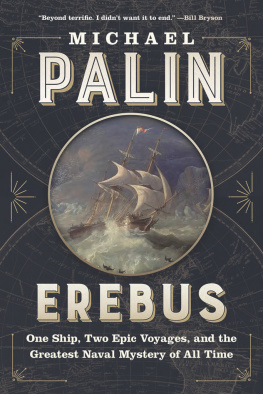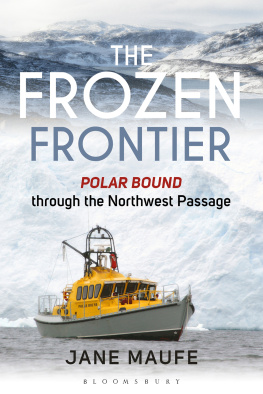Glyn Williams - Arctic Labyrinth: The Quest for the Northwest Passage
Here you can read online Glyn Williams - Arctic Labyrinth: The Quest for the Northwest Passage full text of the book (entire story) in english for free. Download pdf and epub, get meaning, cover and reviews about this ebook. year: 2009, publisher: ALLEN LANE, genre: History. Description of the work, (preface) as well as reviews are available. Best literature library LitArk.com created for fans of good reading and offers a wide selection of genres:
Romance novel
Science fiction
Adventure
Detective
Science
History
Home and family
Prose
Art
Politics
Computer
Non-fiction
Religion
Business
Children
Humor
Choose a favorite category and find really read worthwhile books. Enjoy immersion in the world of imagination, feel the emotions of the characters or learn something new for yourself, make an fascinating discovery.
- Book:Arctic Labyrinth: The Quest for the Northwest Passage
- Author:
- Publisher:ALLEN LANE
- Genre:
- Year:2009
- Rating:4 / 5
- Favourites:Add to favourites
- Your mark:
- 80
- 1
- 2
- 3
- 4
- 5
Arctic Labyrinth: The Quest for the Northwest Passage: summary, description and annotation
We offer to read an annotation, description, summary or preface (depends on what the author of the book "Arctic Labyrinth: The Quest for the Northwest Passage" wrote himself). If you haven't found the necessary information about the book — write in the comments, we will try to find it.
Arctic Labyrinth: The Quest for the Northwest Passage — read online for free the complete book (whole text) full work
Below is the text of the book, divided by pages. System saving the place of the last page read, allows you to conveniently read the book "Arctic Labyrinth: The Quest for the Northwest Passage" online for free, without having to search again every time where you left off. Put a bookmark, and you can go to the page where you finished reading at any time.
Font size:
Interval:
Bookmark:

ALLEN LANE
an imprint of
PENGUIN BOOKS
ALLEN LANE
Published by the Penguin Group
Penguin Books Ltd, 80 Strand, London WC2R 0RL , England
Penguin Group (USA) Inc., 375 Hudson Street, New York, New York 10014, USA
Penguin Group (Canada), 90 Eglinton Avenue East, Suite 700, Toronto, Ontario, Canada M4P 2Y3
(a division of Pearson Penguin Canada Inc.)
Penguin Ireland, 25 St Stephens Green, Dublin 2, Ireland
(a division of Penguin Books Ltd)
Penguin Group (Australia), 250 Camberwell Road, Camberwell, Victoria 3124, Australia
(a division of Pearson Australia Group Pty Ltd)
Penguin Books India Pvt Ltd, 11 Community Centre, Panchsheel Park, New Delhi 110 017, India
Penguin Group (NZ), 67 Apollo Drive, Rosedale, North Shore 0632, New Zealand
(a division of Pearson New Zealand Ltd)
Penguin Books (South Africa) (Pty) Ltd, 24 Sturdee Avenue, Rosebank, Johannesburg 2196, South Africa
Penguin Books Ltd, Registered Offices: 80 Strand, London WC2R 0RL , England
www.penguin.com
First published 2009
Copyright Glyn Williams, 2009
The moral right of the author has been asserted
All rights reserved
Without limiting the rights under copyright reserved above, no part of this publication may be reproduced, stored in or introduced into a retrieval system, or transmitted, in any form or by any means (electronic, mechanical, photocopying, recording or otherwise) without the prior written permission of both the copyright owner and the above publisher of this book
ISBN: 978-0-14-193258-3
The maps, drawn by Reginald Piggott, are taken from The Quest for the Northwest Passage, published by the Folio Society in 2007. Grateful acknowledgement is given to the Folio Society for permission to reproduce them.
No episode in the history of oceanic enterprise offers a greater contrast between anticipation and disillusionment than the centuries-long search for the northwest passage. The first task of anyone describing the search is to explain why despite repeated disappointments, and losses of men and ships, efforts to find a passage continued for more than 300 years. This book, then, is not just a story of discovery voyages, but of the reasoning behind those voyages.
When William Baffin commented in 1616, How many of the best sort of men have set their whole endeavours to prove a passage, he was writing not of himself and those other seamen who risked their lives in northern waters, but of the stay-at-homes who sought the passage not only in conference, but also in writing and publishing to the world. These were the enthusiasts whose untiring belief in the existence of a passage persuaded persons of influence and wealth to send out discovery expeditions. In different centuries Michael Lok, Thomas Roe, Arthur Dobbs and John Barrow all fulfilled that role. The prize of a northern sea passage from Europe to Asia was so great that the natural hazards of the route were not allowed to stand in the way. Given the difficulty of carrying out reliable surveys in waters that were often icebound and fog-shrouded, it is easy to see how hopes survived that a few miles of hidden coastline might conceal the entrance to the promised passage. Despite the criticism by seamen of the closet navigators who had misled them with unsubstantiated theories and speculative maps, a tacit alliance existed between the two; for few explorers were ready to admit complete defeat. Characteristic was the indecision of that maverick seaman Luke Foxe, who, after writing in 1635 that his voyage to Hudson Bay had closed up all the expected hopes of a passage, quickly added that one might still be found. In a later century John Ross and James Clark Ross disagreed fundamentally about their joint voyage in the 1830s, with one insisting that it had totally disproved the possibility of a passage, while the other argued that it had made it still more certain than it was before that a north-west passage must exist. Fragments of optimistic evidence from one failed expedition formed the basis for the next, and there were always geographers and mapmakers ready to put an optimistic gloss on even the most disappointing voyage. Like generals in some endless trench-war, the organizers who sent successive expeditions to find a passage were convinced that the next Push would overcome the last remaining obstacles and reach its objective.
Few of the expeditions were without controversy, and the books written by their leaders were often exercises in self-justification. So compelling were those publications, with their descriptions of fearsome dangers and providential escapes, their weighty scientific appendices, and evocative illustrations, that it is tempting to take them at face value. Here I have used private journals and letters in an attempt to dig beneath the surface of the official accounts to reveal more of the reality of the voyages. The description in Foxes book of his voyage in 1631 looks very different when it is set against the manuscript journals that he and his disputatious ships master kept. The potentially murderous quarrels between officers on the Moor/Smith discovery expedition of 17478 go unmentioned in the published accounts, but are described in the notes of James Isham, the Hudsons Bay Company factor who gave them reluctant shelter. John Franklins account of his journey to the polar sea has long been respected as a classic of northern literature, but one of his companions on that disastrous venture was alleged to have said that things have taken place that must not be known. In the middle of the nineteenth century the voyages of Robert McClure, Edward Belcher and Richard Collinson saw tensions that reached breaking point as captains and subordinate officers exchanged threats of court martial, and some officers spent years under close arrest on their ships; but these disagreeable matters went unmentioned in the published accounts. Not all private journals reveal disputes and insubordination. W. H. Hooper, the ships steward who sailed on four of Edward Parrys Arctic voyages, was a companion of unquestioned loyalty, but his unpublished journals include many details that are not in his captains more restrained official accounts. Finally, the thousands of pages of parliamentary investigations generated by the search for Franklins lost ships are a treasure-house of material that reveal much about the activities and opinions of the explorers not contained elsewhere.
The ships searching for the northwest passage were not the only vessels in Arctic waters, for in most years they were far outnumbered by whalers. It has been estimated that between the seventeenth and nineteenth centuries there were more than 29,000 whaling voyages to Spitsbergen, Davis Strait and Hudson Bay, most of them single-season ventures; but few of the journals of the whaling masters survive, and even fewer were published. Accordingly, accounts of Arctic navigation rely heavily, and perhaps disproportionately, on the experiences of the relatively limited number of discovery expeditions as their officers described the unimaginable conditions they faced. Struggling with words, they tried to explain their reactions as icebergs the size of cathedrals bore down on their tiny vessels, and pack ice gripped them as in a vice. The shifts of the ice could be sudden and capricious, and a clear channel one hour might be blocked by impassable ice the next. Nor was it the ice a few inches thick familiar to readers at home; it might be eight to ten feet deep, as unyielding as granite, and when in thunderous, unstoppable motion could hurl floes on shore a half-mile beyond the high-water mark. The unpredictable variation of the magnetic compass added to the difficulties of navigation, while fog and snow prevented for weeks at a time the taking of sun-sights to establish latitude. And always there was the cold, with temperatures so low that even in the summer sails and rigging froze solid. As one Hudsons Bay Company captain complained, When blocks are locks, and ropes are bolts, and sails can neither be taken in nor left out, is surely the last extremity. It was not. That came in the nineteenth century when immobile and ice-encased ships were trapped for years at a time. In the darkness of the winter months their crews displayed a stoic endurance almost beyond belief; and in the short summer season, dazzled and blinded by the sun, they hauled heavy sledges over the slush on back-breaking journeys of hundreds of miles.
Font size:
Interval:
Bookmark:
Similar books «Arctic Labyrinth: The Quest for the Northwest Passage»
Look at similar books to Arctic Labyrinth: The Quest for the Northwest Passage. We have selected literature similar in name and meaning in the hope of providing readers with more options to find new, interesting, not yet read works.
Discussion, reviews of the book Arctic Labyrinth: The Quest for the Northwest Passage and just readers' own opinions. Leave your comments, write what you think about the work, its meaning or the main characters. Specify what exactly you liked and what you didn't like, and why you think so.

